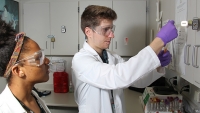Behavioral Pharmacology

Behavioral pharmacology provides the framework for the majority of the laboratory-based research in the Division on Substance Use Disorders. Valuable information about how drugs affect behavior is obtained by bringing drug users or appropriate control groups into the laboratory, administering the drug or drugs of interest, and recording behavioral and physiological effects, e.g., craving and drug self-administration. Most studies involved repeated assessments within each participant such that drug-taking and other drug-related behaviors can be characterized, under carefully controlled conditions. Putative treatment medications, for example, are tested in combination with a drug of abuse to provide not only safety data but data about potential efficacy and behavioral mechanism of action, e .g., decrease in subjective effects, craving, drug taking. Laboratory studies are also often aimed at better understanding the antecedents and consequences of drug use so that better behavioral therapies can be developed. Finally, laboratory studies with human drug users provide an intermediate research point between observations obtained in laboratory animals and the human clinical situation.
Faculty conducting behavioral pharmacology research: